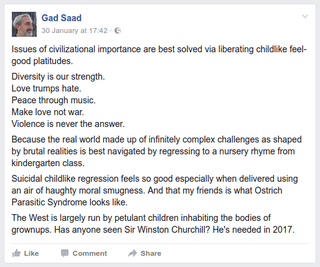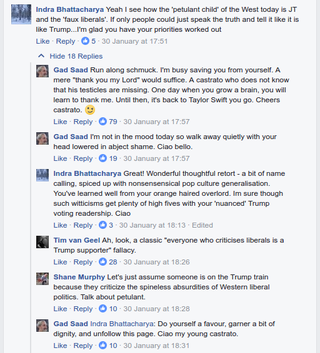In recent months, we've been introduced to the media phenomenon of 'fake news'—news stories based on speculation or spurious evidence that are generally spun to generate ad revenue for the publisher by inciting a particular demographic to read and share them. In the run-up to the 2016 US Presidential elections, an increasing number of 'fake news' stories emerged which targeted partisan issues in an attempt to sway voters.
Alongside the more obvious fake news, which is completely fabricated, there's been little conversation on the grey area in between real news and fake news—generally the less savoury kind of tabloid journalism or opinion pieces. I'm going to coin a term for the purposes of this article and call this middle ground fakeish news—news that isn't always wholly fabricated, but which has an obvious bias and polemical bent (see, for example, the majority of commentary from Ann Coulter).
I believe that this kind of deliberately deceptive reporting is, in many cases, more harmful than fake news, since by its very nature it is both harder to disprove and easier to believe if read without a critical eye.
A publication well known for this kind of news is Breitbart, the far-right news site that emerged as a strident commentator on the 2016 election, and whose former executive chair Steve Bannon is now Senior Counsellor to the President. Although labelled as a fake news outlet by many detractors, most of its stories seem to be fakeish news—opinion pieces or stories deliberately spun to appeal to its reader base.
Let's see if we can deconstruct one of these pieces. To take a simple example, see this recent Breitbart piece on the Daily Mail's claim that Court of Appeals Judge Neil Gorsuch founded a fascist club in high school. This references a rebuttal from the National Review, which points the finger at the Daily Mail and New York Post for running the original pieces.
It's illuminating to examine the language of this Breitbart piece and see how they've spun the story. They begin with a core of 'news'—the story originally run by the Daily Mail on Judge Gorsuch. (It bears mentioning at this point that in the UK the Daily Mail is considered to be one of the worst tabloid newspapers, infamous for poorly researched stories of questionable integrity, so bad reporting on their part is not uncharacteristic).
Breitbart then claim that "Many liberals in the media breathlessly reported" this story. The use of "liberal" here is of itself fairly liberal, since the Daily Mail is a primarily right-wing publication (as is the New York Post). We also have a little suggestive language ("breathlessly", and later "the Daily Mail of Australia insisted") thrown in for effect.
They then assert that "a long list of other news sources picked up the story to smear Gorsuch". A search for other publishing outlets turns up a string of fairly dubious internet publications and some other tabloids, the only apparently reputable "liberal" news source being The Independent.
Finally they direct their attention to Snopes' debunking of the story; "Even the left-wing website Snopes.com admitted that the whole 'fascism club' claim is 100% false". Note the use of "left-wing . . . admitted" to suggest Snopes' complicity in reporting the story, and again smear the "liberal media", despite there being no indication that Snopes ever supported the story. The use of "left-wing website" borders on allowable speculation, although Snopes has no official political position.
So in this short story we have a dubious piece of tabloid journalism spun as a concerted liberal attack on Judge Gorsuch. In actual fact, it appears to be more of a me-tooism from a collection of tabloid news outlets. Poor reporting, yes. A liberal conspiracy, not so much.
This microcosm is reflected in many similar stories on Breitbart and other 'news' outlets, both left- and right-wing (although according to The Atlantic, increasingly targeting the left). These stories are worrying given the scale of the publishers, since they implies a trustworthiness which isn't merited. However, the more worrying kind of fake news in my eyes is those commentators who pose opinion pieces and polemic as news.
One example I've seen of this is from an individual named Dr. Gad Saad. In his professional capacity he appears to be fairly well qualified—an evolutionary behavioural scientist, he holds a PhD and has published various books and articles on his research. However, on social media he positions himself as a right-wing agitator, publishing his commentary on news and events, and interviewing such controversial figures as Milo Yiannopoulos.
Many of Gad's Facebook posts follow a common formula:
- Pick a fact or news article
- Exaggerate or warp the it to fit his message
- Construct a strawman argument around this fact
- Shout down any disagreement with ad hominem attacks
Here's an example from a recent post on Facebook:

The core thesis of this post is his list of left-wing 'platitudes' (1), which he has then exaggerated to form an impractical generalisation (2), then posed the argument that they are impractically general and do not fit with a realistic worldview (3). After posting this someone had the temerity to disagree with him, so he commenced step (4):

Ironically, as soon as the commenter is percieved to be making a generalisation about the right wing (that they are Trump supporters), Gad's supporters immediately take offence. It's interesting to note Gad Saad's use of 'castrato' as an ad hominem insult, in a similar manner to the alt-right community's use of 'cuckold', implying that the commenter is less of a 'man' for his disagreement.
Gad Saad has a fondness for inventing insulting terminology for his opponents. The fictional condition 'Ostrich Parasitic Syndrome' mentioned in his post is defined by him as follows:
A few days I coined a term for a very virulent virus of the human mind that is causing untold global ravage—Ostrich Parasitic Syndrome or OPS for short. This disorder causes a person to reject realities that are otherwise as a clear as the existence as gravity. Sufferers of OPS do not believe their lying eyes. They construct an alternate reality known as 'Unicornia'. In such a world, science, reason, rules of causality, evidentiary thresholds, a near-infinite amount of data, data analytic procedures, inferential statistics, the epistemological rules inherent to the scientific method, rules of logic, historical patterns, daily patterns, and common-sense, are all rejected. Instead, the delusional ramblings of an OPS sufferer are rooted in illusory correlations, nonexistent causal links, and feel-good progressive platitudes.
Ostrich logic is always delivered via an air of haughty moral superiority. Two telltale signs of comorbidity include a nasty form of the Dunning-Kruger effect, namely arrogant and self-assuredness about one's idiocy, and an introspective blindness, namely an inability to ever know that you are afflicted with OPS. These comorbid factors, when coupled with OPS, render meaningful dialogue impossible. Soldiers of reason, let us work with the same alacrity as earlier generations of virus-hunters, such as, say, Dr. Jonas Salk's efforts gainst Polio, and eradicate this dreadful disorder.
Transcript of Gad Saad's YouTube video on Ostrich Parasitic Syndrome
This is a wonderfully constructed piece of dialogue, combining a misleading scientific metaphor to suggest legitimacy with a large dose of fiction. My favourite part is the closing statement—in effect, "if you disagree with me, and I label you with this condition, you are too stupid to know that you are wrong". What a get-out clause.
I should reiterate here that I'm not implying that fake(ish) news is a partisan phenomenon. Whichever political bias fake news takes, it is a dangerous issue, as it exacerbates (and is exacerbated by) the echo-chambers that social media allows us to create. It's important to be able to draw a line between news reporting and inflammatory rhetoric, and this line has become increasingly blurred.
What is the solution? I would argue that it is not the regulation of the media, since this issue is too nuanced to begin censoring stories based on 'factual' merit. Where would this lead? To publication of all sources (which many media outlets would likely be wary of)? To censorship of opinions that disagree with the establishment? No, this is a dangerous path.
I would also be wary of addressing this kind of misinformation via social media. A 140 character snippet doesn't lead to meaningful dialogue, with Twitter's format rewarding the pithy put-down over interesting insights.
I believe the solution is better critical education to help readers better evaluate the veracity of a piece of news. Being able to separate fact from fiction, statement from rhetoric, and reporting from opinion would be a great start. There is a place for commentary and opinion in news reporting, but the reader must be able to critically judge for themselves what to believe.
I also believe that the solution is not for either side to be proven correct, but for us to find a common middle-ground. The next time you see someone sharing this kind of misinformation, avoid being combative and instead talk to them like an adult. Who knows; you might learn something interesting.